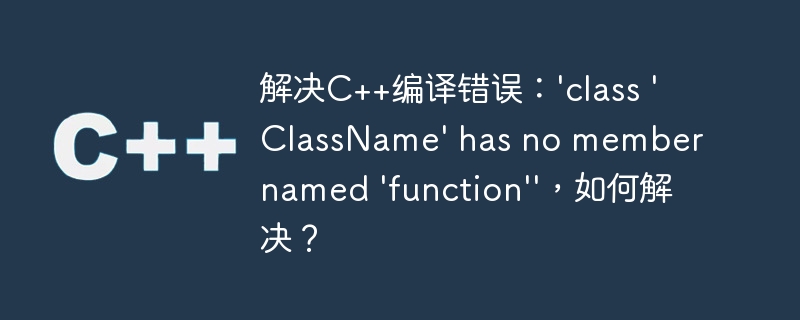

Solution to C compilation error: 'class 'ClassName' has no member named 'function'', how to solve it?
During the C programming process, compilation errors are often encountered. Among them, a common error is: "'class 'ClassName' has no member named 'function'". This error means that we are using a non-existent member function in a class. In order to solve this error, we need to inspect the code and find out where the problem lies. Next, I will detail several possible causes of this error and the corresponding solutions.
In C, identifiers (such as class names and function names) are case-sensitive. Therefore, if we spell the function name incorrectly when calling a member function of a class, it will cause a compilation error. The way to fix this problem is to double-check your code for typos.
The sample code is as follows:
class MyClass {
public:
void myFunction() {
// 实现
}
};
int main() {
MyClass obj;
obj.myFunctionn(); // 错误: 'class 'MyClass' has no member named 'myFunctionn''
return 0;
}In the above code, we incorrectly spelled the function name myFunctionn as myFunction, resulting in a compilation error . The correct way to write it is obj.myFunction().
Before using the member function of the class, we need to declare and define the function first. If we forget to declare or define a member function when calling it, it will cause a compilation error. The way to solve this problem is to ensure that the function is declared or defined before using it.
The sample code is as follows:
class MyClass {
public:
void myFunction(); // 函数声明
};
int main() {
MyClass obj;
obj.myFunction(); // 错误: 'class 'MyClass' has no member named 'myFunction''
return 0;
}
// 函数定义
void MyClass::myFunction() {
// 实现
}In the above code, we forgot to declare or define it before calling myFunction(), resulting in a compilation error. The correct way to write it is to declare it before the member function definition of the class, or place the function definition before the call.
In object-oriented programming, C class members have three access permissions: public, private and protected ( protected). If we use private or protected member functions outside the class, it will cause compilation errors. The way to fix this is to make sure we are accessing member functions with the correct access permissions.
The sample code is as follows:
class MyClass {
private:
void myPrivateFunction() {
// 实现
}
};
int main() {
MyClass obj;
obj.myPrivateFunction(); // 错误: 'class 'MyClass' has no member named 'myPrivateFunction''
return 0;
}In the above code, we called the private function myPrivateFunction() outside the class, resulting in a compilation error. Private functions can only be used inside the class. If we want to use the function outside the class, we can declare it as a public function.
By checking these possible causes of compilation errors, we can easily solve the C compilation error: "'class 'ClassName' has no member named 'function'". Whether it's a typo, a function not declared or defined, or incorrect access permissions, we can resolve this error by reviewing the code and fixing it accordingly. This will allow our program to compile and run correctly.
The above is the detailed content of Solve C++ compilation error: 'class 'ClassName' has no member named 'function', how to solve it?. For more information, please follow other related articles on the PHP Chinese website!




